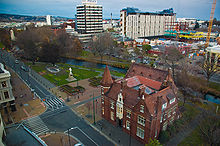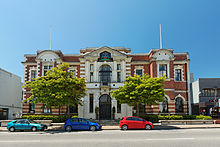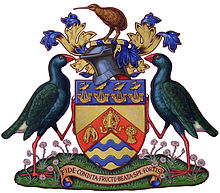- Christchurch City Council
-
 Current logo of the Christchurch City Council.
Current logo of the Christchurch City Council.
 A view of part of Christchurch's central business district, showing the former (building on lower right corner) and the Former New Zealand Post office, which was updated in 2009-10 by the architectural firm Ian Athfield and Associates to become the new Civic Offices (large white building in centre right rear).
A view of part of Christchurch's central business district, showing the former (building on lower right corner) and the Former New Zealand Post office, which was updated in 2009-10 by the architectural firm Ian Athfield and Associates to become the new Civic Offices (large white building in centre right rear).
The Christchurch City Council is the local government authority for Christchurch in New Zealand. It is a territorial authority elected to represent the 376,700 people of Christchurch.[1] Since 2007, the Mayor of Christchurch is Bob Parker, who stood as an independent candidate.[2] The council consists of 13 members elected from seven wards, and is presided over by the Mayor, who is elected at large.
Contents
History
The coat of arms of the City of Christchurch, New Zealand.
As a result of the 1989 local government reforms, on 1 November 1989 Christchurch City Council took over the functions of the former Christchurch City Council, Heathcote County Council, Riccarton Borough Council, Waimairi District Council, part of Paparua County Council, and the Christchurch Drainage Board. On 6 March 2006, Banks Peninsula District Council merged with Christchurch City Council.
Elections
The Council is elected every three years using the first past the post voting system. The vote is conducted by postal ballot. The most recent elections, which closed on 13 October 2007, had a turnout of 41.7%.[2]
For electoral purposes, Christchurch is divided into seven wards. The six metropolitan wards each elect two Councillors, with the remaining Councillor elected for the sparsely populated Banks Peninsula ward.
Party politics are much less influential in elections to the Council than is the case for the House of Representatives. In 2007, the Mayor and a majority of Councillors were elected as independent candidates. Political groupings represented on the Council are the centre-right Independent Citizens[3] and the centre-left Christchurch 2021.[4]
Council members
As of October 2010[update], the composition of the Council is as follows:
Ward Councillor(s) Mayor Bob Parker (Independent) Deputy Mayor Ngaire Button (IC) Banks Peninsula Claudia Reid (Independent) Burwood-Pegasus Glenn Livingstone ( Christchurch 2021), Chrissie Williams (Christchurch 2021) Fendalton-Waimari Sally Buck (independent), Jamie Gough (IC) Hagley-Ferrymead Tim Carter (Independent), Yani Johanson (Christchurch 2021) Riccarton-Wigram Helen Broughton (IC), Jimmy Chen (Christchurch 2021) Shirley-Papanui Ngaire Button (IC), Aaron Keown (Christchurch City Vision) Spreydon-Heathcote Barry Corbett (Independent), Sue Wells (Independent) Organisation
Mayor, council and committees
See also: Mayor of ChristchurchUnder most circumstances, the Council is presided over by the Mayor. At its first meeting after a local election, the Council elects from among its members a Deputy Mayor, who acts as Mayor in the absence and with the consent, or in the incapacity, of the Mayor. The Deputy Mayor also presides at meetings if the Mayor is not present. The Deputy Mayor is recommended by the Mayor and is either confirmed or replaced in a vote of the first council meeting.
Councillors also serve on a number of committees. As of 2008[update], there is one Standing Committee, eight Standing Subcommittees, seven Joint Standing Committees and Working Parties (so called because they involve members of other local authorities), and 14 ad hoc subcommittees and working parties. The Council can delegate certain powers to these committees, or alternatively they can consider matters in more detail and make recommendations to the full Council.
Community Boards
The Council has established eight Community Boards. These Community Boards deal with matters delegated to them by the Council, act as representatives and advocates for their communities, and interact with community organisations and interest groups. General tasks typically delegated to local community boards are the locations of Council rubbish bins, traffic light, stop sign and pedestrian crossings; Also rubbish collection, local disturbance review and relaying information to the main council from their Ward area through the Councillor who has a right to sit on the Board within their ward.
Each of the metropolitan wards has one Community Board, composed of the two Councillors for that ward, who serve ex officio, and five other members elected by the residents of the ward. The Banks Peninsula ward is divided geographically between the Lyttelton–Mt Herbert and Akaroa–Wairewa community boards, each of which consists of five elected board members and the Councillor for Banks Peninsula.[5]
Some Community Boards, like the Council, have created committees for specific purposes.
Organisational support
The day-to-day administration of the City of Christchurch is carried out by a large team of Council staff. Indeed, in everyday usage, the term the council is extended to include not just the Mayor and Councillors, but the entire local civil service. The professional head of the civil service is the Chief Executive, who is appointed by the Council under contract for up to five years. The Chief Executive is assisted by eight General Managers, each with his or her own portfolio.
Mayor and Executive Team
Office Incumbent Mayor Bob Parker Deputy Mayor Ngaire Button Chief Executive Tony Marryatt General Manager of Capital Program Kevin Locke General Manager of City Environment Jane Parfitt General Manager of Community Services Michael Aitken General Manager of Corporate Services Paul Anderson General Manager of Human Resources Chris Till General Manager of Public Affairs Lydia Aydon General Manager of Relegation and Democracy Services Peter Mitchell General Manager of Strategy and Planning Mike Theelen Responsibilities and services
See also: Territorial authorities of New ZealandThe Council is vested with a power of "general competence" for the social, economic and cultural well-being of Christchurch. In particular, the Council has responsibility for a range of local services, including roads (except State Highways), water, sewerage, waste collection, parks and reserves, and libraries. Urban development is managed through the maintenance of a city plan and associated zoning regulations, together with building and resource consents. The Council has been given extra powers to regulate certain types of business operations, notably suppliers of alcohol and brothels.
Kerbside waste collection
Christchurch has a wheelie bin kerbside collection system, which replaced their previous system. The previous system required the resident to put a black rubbish bag out every week to the kerbside, along with a green recycling crate. With the current system, residents are given three wheelie bins: One 240 litre bin (recycling), One 140 litre bin (rubbish), and one 80 litre bin (organics). Each week, residents can put two of the three bins out. The 80 litre organics bin goes out every week and the 240 litre recycling and the 140 litre rubbish alternate.
Christchurch City Libraries
See also: Christchurch City LibrariesOffices
 The Civic in 2009
The Civic in 2009
- 1862–1887
The Christchurch Municipal Council, as it was originally called, was using the Christchurch Land Office, the first public building erected in Christchurch in 1851.[6]
- 1887–1924
On the same site, the council had the so far only purpose-built council chambers constructed, designed by Samuel Hurst Seager in a Queen Anne style. The building is these days known as Our City and is registered as a Category I heritage building with the New Zealand Historic Places Trust (NZHPT).[6][7]
- 1924–1980
Council purchased the burned out shell of the former Canterbury Hall and built new civic offices in Manchester Street. These days known as the Civic, the building is registered as a Category II heritage building with the NZHPT.[6][8]
- 1980–2010
Council bought the former Hays Department Store and moved to 163 Tuam Street in 1980.[6] This gave rise to the occasional metonymic use of Tuam Street to refer to the municipal government. The building is registered as a Category II heritage building with the NZHPT.[6][8]
- 2010 to present
In August 2010,[6] the Council's new offices were officially opened in a refurbishment of the former Christchurch Mail Sorting Centre, designed by the Ministry of Works in 1974. The redevelopment was supervised by Wellington based architect Ian Athfield.
The council also maintains service centres in the suburbs of Fendalton, Linwood, Papanui, Riccarton, Shirley, Sockburn and Sydenham, and in the towns of Lyttelton, Little River and Akaroa.
See also
- Christchurch City Holdings, a wholly owned investment arm of the Christchurch City Council
- Coat of arms of the City of Christchurch, granted to the Christchurch City Council in 1949
References
- ^ "Subnational population estimates at 30 June 2010 (boundaries at 1 November 2010)". Statistics New Zealand. 26 October 2010. http://www.stats.govt.nz/~/media/Statistics/Methods%20and%20Services/Tables/Subnational%20population%20estimates/subpopest2001-10.ashx. Retrieved 7 March 2011.
- ^ a b Elections 2007, Results — Electoral Officer's Declaration, Christchurch City Council, New Zealand, 2007. Accessed 2009-03-18.
- ^ Independent Citizens Association: http://www.independentcitizens.org.nz
- ^ Christchurch 2021: http://www.2021.org.nz
- ^ Christchurch City Council Governance Statement, p.8. http://www.ccc.govt.nz/Council/GovernanceStatement/GovernanceStatement.pdf
- ^ a b c d e f "Remembering our former homes as we move to the Council's new Home on Hereford". Christchurch City Council. http://www.ccc.govt.nz/cityleisure/artsculture/christchurchheritage/archives/formerhomes.aspx. Retrieved 21 April 2011.
- ^ "Our City". Register of Historic Places. New Zealand Historic Places Trust. http://www.historic.org.nz/TheRegister/RegisterSearch/RegisterResults.aspx?RID=1844&m=advanced. Retrieved 22 April 2011.
- ^ a b "Civic". Register of Historic Places. New Zealand Historic Places Trust. http://www.historic.org.nz/TheRegister/RegisterSearch/RegisterResults.aspx?RID=1870&m=advanced. Retrieved 22 April 2011.
External links
Categories:- Organisations based in Christchurch
- Politics of Christchurch
- City councils in New Zealand
Wikimedia Foundation. 2010.

